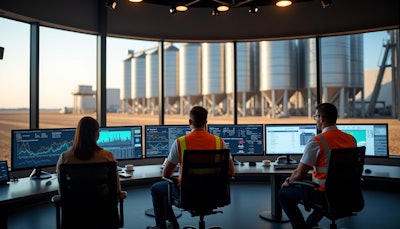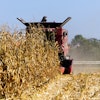
Grain elevators stand as major employment hubs within the agricultural industry. Illinois agricultural operations alone provide jobs for nearly 1 million people. The sector offers numerous career paths that many job seekers overlook, with 49% of agricultural positions existing away from farmlands.
These facilities have undergone significant evolution since their introduction in 1843. What began as basic storage structures now operate as sophisticated facilities equipped with full automation systems, programmable logic controls, and advanced grain preservation technologies. Current grain elevator operations require professionals skilled in biochemistry, environmental engineering, and agricultural economics—fields not traditionally associated with grain handling.
Career options within grain elevators span specialized technical positions, support roles, and emerging opportunities. Industry projections indicate substantial growth, with 59,400 annual job openings expected in agricultural areas from 2020 through 2025. Professionals from diverse disciplines will find the grain handling industry offers solid career prospects with pathways for advancement and specialization.
Behind-the-scenes roles at modern grain elevators
Specialized personnel work continuously behind the scenes at modern grain elevators to maintain operations, ensure quality, and uphold safety standards. These facilities function as complex ecosystems where professionals from various disciplines collaborate throughout the grain handling process from receipt to shipment.
Maintenance operators form the backbone of grain elevator operations. Daily equipment upkeep, preventative maintenance, and machinery inspections fall under their essential responsibilities. These specialists manage critical systems including conveyor belts, pneumatic components, and production machines while addressing mechanical issues that might disrupt operations. Their duties also include receiving trucks, directing grain to appropriate bins, and transferring products to mills.
Quality control professionals verify grain meets strict industry standards. Grain inspectors examine, grade, and certify agricultural commodities to ensure food safety for human and animal consumption. Laboratory equipment helps these specialists detect mycotoxins, measure protein content, and determine moisture levels. Grade certificates issued according to United States Grain Standards represent another key responsibility, with inspectors working alongside elevator superintendents to coordinate inspection activities.
Safety coordinators fulfill critical functions due to the inherent hazards present in grain environments. Safety protocol development, regular audits, and incident investigations fall under their purview. Environmental compliance officers monitor dust control measures and waste management systems while ensuring facilities meet regulatory requirements.
Grain elevator operators focus on storage condition monitoring to prevent spoilage, with regular humidity and temperature checks. Strict safety protocols guide their operation of machinery such as grain augers and conveyor systems. Detailed logs of grain measurements and quality inspections provide accountability throughout the supply chain.
The specialized knowledge these professionals possess—covering agricultural processes, mechanical systems, and safety regulations—makes them essential to modern grain handling operations. Their collective expertise enables efficient grain movement from farm to market while preserving product integrity.
Technology-driven positions transforming the industry
New career pathways at grain elevators continue to emerge through technological innovation. Modern facilities now require technology specialists who form an essential component of daily operations—positions that didn't exist a decade ago.
Grain Management Software Specialists see growing demand as elevators adopt digital solutions. These professionals oversee systems providing real-time inventory reporting, automated contract management, and integrated accounting functions. Elevator managers rely on these specialists to access accurate positioning data during negotiations and inventory planning, eliminating estimation errors while improving operational efficiency.
IoT and Sensor Technology Experts manage advanced monitoring systems now central to grain quality management. Digital sensors tracking temperature, humidity, carbon dioxide levels, and other critical parameters require specialized knowledge for deployment and maintenance. These monitoring systems detect early quality changes in stored grain, preventing product loss and maintaining integrity standards.
Data Analysts and Agricultural Technologists process information generated by modern grain handling systems. Market prices, inventory levels, and storage costs undergo careful tracking, enabling fact-based decisions that optimize profitability. Custom reports developed by these professionals allow facility managers to view operations from multiple perspectives, creating competitive advantages.
Digital Logistics Specialists coordinate transportation through specialized platforms like FOB Ag Logistics. Key responsibilities include managing:
- Digital dispatch systems for efficient truck scheduling
- Real-time tracking technologies providing location updates and ETAs
- Automated invoicing and digital ticketing systems replacing paper records
Automation and Controls Technicians create, program, and troubleshoot PLC programs that control process equipment. Their technical expertise covers multiple automation languages including Studio 5000, RSLogix 5000/500, and GE systems. HMI control screen development and automation network configuration also fall under their domain, establishing the technical foundation for automated grain facilities.
These technology-focused roles represent significant growth areas within grain elevator operations, offering career paths for technically skilled professionals interested in agricultural and food systems.
Specialized support careers at grain elevators
Grain facilities rely on a diverse ecosystem of specialized support careers beyond their operational and technological requirements. These professionals help elevators succeed within complex agricultural markets.
Agricultural economists analyze market trends and assess policy impacts on agricultural commodities for grain elevators. Economic models examining agricultural markets constitute a key part of their work, alongside stakeholder collaboration to understand policy implications. Success in this field demands strong agricultural sciences knowledge combined with econometric software proficiency.
Sustainability coordinators fill an emerging role at modern grain facilities. Environmental initiative oversight, sustainability regulation response, and ecological footprint reduction fall under their responsibilities. These specialists review sustainability proposals from government and private sectors while developing educational materials about environmental practices relevant to grain handling.
Grain marketing specialists connect producers with elevators through four primary functions:
- Inbound inventory management and procurement service marketing to producers
- Risk management solution creation and positioning for farmers
- Existing customer relationship maintenance alongside new business development
- Contract administration and pricing information provision
Customer relationship management specialists work with agricultural-specific CRM systems to enhance service quality and streamline processes. Contact organization, market indicator tracking, and agricultural enterprise data analysis help grain elevators improve their customer interactions and business intelligence.
Training specialists address workforce challenges faced by modern facilities. Scoular's Elevation Training exemplifies structured development programs, preparing operators for management positions through 18-month apprenticeships focused on leadership skills. Industry organizations like GEAPS create specialized resources including the "Welcome to the Grain Industry" course and technical glossaries for new professionals.
Career opportunities at grain elevators extend far beyond traditional loading and unloading operations. These support roles create professional pathways for individuals with backgrounds in economics, marketing, environmental science, and education.
Career opportunities at modern grain elevators extend far beyond what most people recognize. These facilities have evolved from basic storage units into sophisticated operations requiring diverse professional expertise. Career paths span traditional operational roles, technology positions, and specialized support functions, offering opportunities for professionals with various educational backgrounds and skill sets.
Grain elevator career scopes continue to expand through agricultural technology advancements. Software specialists, data analysts, and automation experts now work as essential team members alongside traditional operators and maintenance personnel. Support roles focused on economics, sustainability, and training further broaden options for professionals combining agricultural knowledge with specialized expertise.
Job seekers should consider the grain handling industry as a viable career path where traditional agricultural knowledge merges with modern technology applications and specialized expertise, creating distinctive professional opportunities.
.jpg?auto=format%2Ccompress&crop=faces&fit=crop&h=48&q=70&w=48)


















